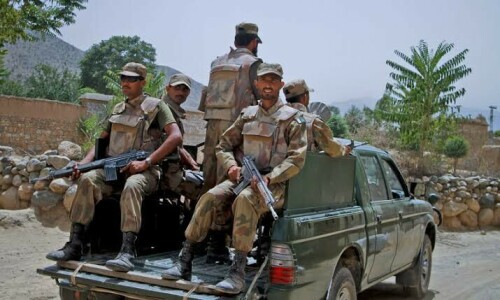One of my guests from Karachi after visiting half of the 36 valleys of Chitral remarked that the Chitral River is useless for the local people.
“It is useless for you people; no irrigation, no transportation, no hydropower generation, no recreational activities, and no fishing,” he went on to irritate me with his remarks about the Chitral River. As we treaded along the river during the days he was prompt to note that there were very few irrigation channels drawing the river water while there were numerous tracts of barren land on either side of the river.
He had noted not a single hydropower station being run by the river water while Chitral city was plagued by prolonged power loadshedding. My guest had seen no people fishing in the river which was supposed to be brimming with local species of fish and there was not a single outlet in the market dealing in fish meat. He had also noted that the river could be used for transportation purposes through boating.
Very few canals could be excavated from the river to irrigate the nearby villages or make the barren lands arable due to location of the river in low depths from where no gravity flow is possible. During the Katoor dynasty, spanning over 500 years before 1947, a few canals were excavated to bring arid land under cultivation which included those in Bumbagh, Junali Koch, Awi Lusht, Charun, Damik and others.
Interestingly, after independence the irrigation department did not carry out a single project of irrigation channel though the riverside villages faced acute scarcity of water. In this regard, the Aga Khan Rural Support Programme did some efforts to widen some of the river-fed irrigation channels for passing large volume of water. One of the major hurdles to the construction of channels from the river is the rocky and mountainous topography which entails a large sum of money for cutting the rocks.
The Chitral River is conglomeration of about 36 tributaries emanating from the same number of segregated valleys of the district. The river originates from Chiantar glaciers in Baroghil area situated in the extreme north and traverses a distance of 496 kilometres before entering the Kunar province of Afghanistan to re-enter the Peshawar valley in Warsak where it is named as the Kabul River. The second major tributary of the river emanates from the glaciers surrounding Terich Mir, the highest peak of Hindu Kush mountains.
The tributary is joined by Torkhow River at the foot of Terich valley which further joins the one coming from Chiantar glaciers at Kuragh near Booni. Gankorini Singoor is the confluence of two major rivers, one coming from upper Chitral and the other from Lotkoh valley which is the confluence of four major tributaries namely Injigan (coming from Gobor valley), Arkariogh, Karimabad River and Murdan River. From downstream Chitral town, the river is added by the waters of Jughoor, Broze, Kalash valleys of Bumburate and Rumbur, Kalash valley Birir, Sheshi, Beori, Ashrait, Arsoon and Damil before it flows to the border area of Arandu from where it runs into the Afghan area.
Professor Mumtaz Hussain, an academician, said that the river had created many hurdles for the local people in the past when there was dearth of resources with the local rulers who did not afford to build bridges over the river. He said that in summer season many villages used to remain cut off from each other as the makeshift bridges erected by the local people washed away by the high flood and they used long detours to get to the village situated on the opposite side across the river.
He said that in the olden days, when the water supply schemes through pipelines were not in practice, the people of the riverside villages fetched water from the river and it provided for a source of drinking water. In the classic poems and prose of Khowar (Chitrali language), one finds frequent description of the romance that took place at the time of fetching water while usually it was the duty of women folk who thronged to the riverbank in groups at the time of sunset.
In the recent years, the trend of committing suicide among the womenfolk is on the rise and in most of the cases they have been reported to have committed suicide by jumping into the river. Rashid Ali, a retired police officer, said that over 90 per cent of the suicides of women in Chitral took place through jumping into the river. Describing the tangible influence of river on the local people, Dr Inayatullah Faizi, a former project manager of IUCN, said that for the extraction of alluvial gold from the sandy water of river a large number of people from other areas, mostly from Gilgit, came to Chitral and settled along the riverbanks.
He said that the interaction of two different cultures took place and led to influence the local culture and they lost and gained a number of cultural traits and customs from the aliens.
Dr Faizi said that nowhere in other areas outside Chitral such a variety of pedestrian suspension bridges are found as in Chitral which were disjointed with the advent of summer season to save them from being washed away and cobbled together again when the water level in the river receded.
The local leaders have been yearning to rename the river as Chitral River instead of Kabul River after it reenters the Pakistani area near Warsak in Peshawar. MPA from upper Chitral, Sardar Hussain Shah, termed it an injustice with the people of Chitral not to name the river after it. He contended that the river had its origin in Chitral and it was the valley of Chitral which was subjected to the devastation when it was in high floods in summer season.
He demanded that the district should also be given a special share in the royalty which the province got from the centre for the water of hydropower generation.
Published in Dawn, September 17th, 2017












































